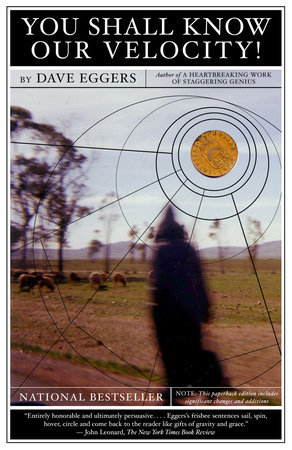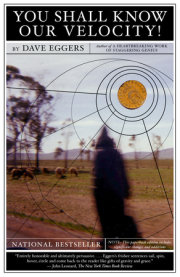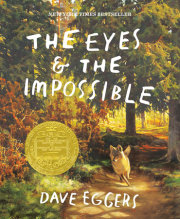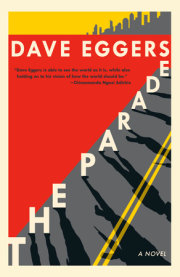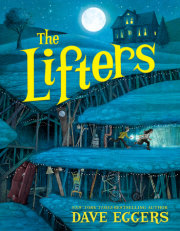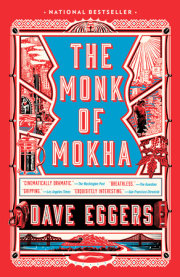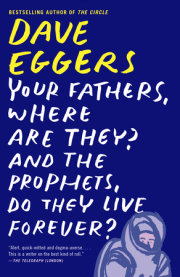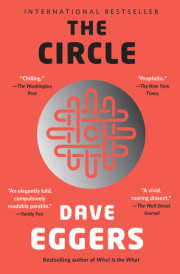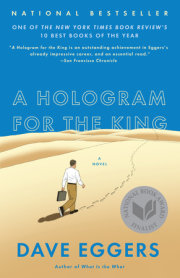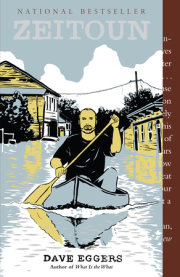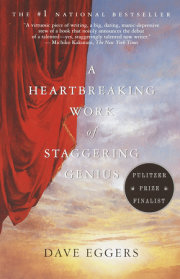EVERYTHING WITHIN TAKS PLACE AFTER JACK DIED AND BEFORE MY MOM AND I DROWNED IN A BURNING FERRY IN THE COOL TANNIN-TINTED GUAVIARE RIVER, IN EAST-CENTRAL COLOMBIA, WITH FORTY-TWO LOCALS WE HADN'T YET MET. IT WAS A CLEAR AND EYEBLUE DAY, THAT DAY, AS WAS THE FIRST DAY OF THIS STORY, A FEW YEARS AGO IN JANUARY, ON CHICAGO'S NORTH SIDE, IN THE OPULENT SHADOW OF WRIGLEY AND WITH THE WIND COMING LOW AND SEARCHING OFF THE JAGGED HALF-FROZEN LAKE. I WAS INSIDE, VERY WARM, WALKING FROM DOOR TO DOOR.
I was talking to Hand, one of my two best friends, the one still alive, and we were planning to leave. At this point there were good days, good weeks, when we pretended that it was acceptable that Jack had lived at all, that his life had been, in its truncated way, complete. This wasn't one of those days. I was pacing and Hand knew I was pacing and knew what it meant. I paced like this when figuring or planning, and rolled my knuckles, and snapped my fingers softly and without rhythm, and walked from the western edge of the apartment, where I would lock and unlock the front door, and then east, to the back deck's glass sliding door, which I opened quickly, thrust my head through and shut again. Hand could hear the quiet roar of the door moving back and forth on its rail, but said nothing. The air was arctic and it was Friday afternoon and I was home, in the new blue flannel pajama pants I wore most days then, indoors or out. A stupid and nervous bird the color of feces fluttered to the feeder over the deck and ate the ugly mixed seeds I'd put in there for no reason and lately regretted--these birds would die in days and I didn't want to watch their flight or demise. This building warmed itself without regularity or equitable distribution to its corners, and my apartment, on the rear left upper edge, got its heat rarely and in bursts. Jack was twenty-six and died five months before and now Hand and I would leave for a while. I had my ass beaten two weeks ago by three shadows in a storage unit in Oconomowoc--it had nothing to do with Jack or anything else, really, or maybe it did, maybe it was distantly Jack's fault and immediately Hand's--and we had to leave for a while. I had scabs on my face and back and a rough pear-shaped bump on the crown of my head and I had this money that had to be disseminated and so Hand and I would leave. My head was a condemned church with a ceiling of bats but I swung from this dark mood to euphoria when I thought about leaving.
"When?" said Hand.
"A week from now," I said.
"The seventeenth?"
"Right."
"This seventeenth."
"Right."
"Jesus."
"Can you get the week off?"
"I don't know," Hand asked. "Can I ask a dumb question?"
"What?"
"Why not this summer?"
"Because."
"Or next fall?"
"Come on."
"What?"
"I'll pay for it if we go now," I said. I knew Hand would say yes because for five months we hadn't said no. There had been some difficult requests but we hadn't said no.
"And you owe me," I added.
"What? For--Oh Jesus. Fine."
"Good."
"For how long again?" he asked.
"How long can you get off?" I asked.
"Probably a week." I knew he would do it. Hand would have quit his job if they refused the time off. He had a decent arrangement now, as a security supervisor on a casino on the river under the Arch, but for a while, in high school, he'd been the Number Two- ranked swimmer in all of Wisconsin, and he expected that kind of glory going forward. He'd never focused again like he'd focused then, and now he was a dabbler, with some experience as a recording engineer, some in car alarms, some in weather futures (true, long story), some as a carpenter--we'd actually worked on one summer gig together, a porch on an enormous gingerbread-looking place on Lake Geneva--but he left any job where he wasn't learning or when his dignity, however defined, was anywhere compromised.
"Then a week," I said. "We'll do what we can in a week."
I lived in Chicago, Hand in St. Louis, though we were both from Milwaukee, or just outside. We were born there, three months apart, and our dads bowled together, before mine was gone the first time, before his started playing drums, wearing suspenders and leather vests. We didn't talk about our fathers.
We called the airlines that offered single-fare tickets with unlimited travel. The tickets allowed unrestricted flying as long as you kept going one direction, once around the globe without turning back. You usually have twelve months to complete the circuit, but we'd have to do it in a week. They cost $3,000 each, a number out of the reach of people like us under normal circumstances, in rational times, but I had gotten some money about a year before, in a windfall kind of way, and had been both grateful and constantly confused by it. And now I would get rid of it, or most of it, and believed purging would provide clarity, and that doing this in a quick global flurry would make it . . . I really don't know why we combined these two ideas. We just, blindly and without self-doubt, figured we would go all the way around, once, in a week, starting in Chicago, ideally hitting Saskatchewan first, then Mongolia, then Yemen, then Rwanda, then Madagascar--maybe those last two switched around--then Siberia, then Greenland, then home. Easy.
"This'll be good," said Hand.
"It will," I said.
"How much are we getting rid of again?"
"I think $38,000."
"Is that including the tickets?"
"Yeah."
"So we're actually giving away what--$32,000?"
"Something like that," I said.
"How are you going to bring it? Cash?"
"Traveler's checks."
"And then we give it to who?" he asked.
"I don't know yet. I think it'll be obvious when we get there."
And if we kept traveling west, we'd lose very little time. We could easily make our way around the world in a week, with maybe five stops along the way--the hours elapsed would in part be voided by the crossing, always westerly, of time zones. From Saskatchewan we'd get to Mongolia, we figured, having lost only two or three hours riding the Arctic Circle. We would oppose the turning of the planet and refuse the setting of the sun.
The itinerary changed on each of the four days we had to decide, on the phone, with me consulting a laminated pocket atlas and Hand in St. Louis with his globe, a huge thing, the size of a beach ball, which spun wildly between poles--he'd bumped into it one late night and it was no longer smooth--and which dominated his living room.
So first:
Chicago to Saskatchewan to Mongolia
Mongolia to Qatar
Qatar to Yemen
Yemen to Madagascar
Madagascar to Rwanda
Rwanda to San Francisco to Chicago.
We liked that one. But it was too warm, too concentrated in one latitude. The next one, with adjustments:
Chicago to San Francisco to Mongolia
Mongolia to Yemen
Yemen to Madagascar
Madagascar to Greenland
Greenland to Saskatchewan
Saskatchewan to San Francisco to Chicago.
We'd solved the warmth problem, but went too far the other way. We needed better contrast, more back and forth, more up and down, while always heading west. The third itinerary:
Chicago to San Francisco to Micronesia
Micronesia to Mongolia
Mongolia to Madagascar
Madagascar to Rwanda
Rwanda to Greenland
Greenland to San Francisco to Chicago.
That one had everything. Political intrigue, a climactical buffet. We began, separately at home, plugging the locations into various websites listing fares and timetables.
Hand called.
"What?"
"We're fucked."
There was something wrong with the timetable. He'd entered in the destinations, but every time we left San Francisco--we had to stop there en route from Chicago--we'd end up in Mongolia not a few hours later, but two damned days later.
"How can that be?"
"I figured it out," Hand said.
"What?"
"You know what it is?"
"What?"
"I'm going to lay it on you."
"Tell me."
"Ready?"
"Fuck yourself."
"The international date line," he said.
"No."
"Yes."
"The international date line!"
"Yes."
"Fuck the international date line!" I said.
"Can we do that?" he asked.
"I don't know. How does it work again?"
"Well, New Zealand is the farthest point, time-wise, in the world. They see the new year first. Which means that if we're traveling west from Chicago, we're doing pretty well in terms of saving time all the way until New Zealand. But once we get past there, we're a day ahead. A full day ahead."
"We lose a whole day."
"If we leave Wednesday, we land Friday."
"So it won't help to be going west," I said.
"Not much. Not at all, really."
We called an airline representative. She thought we were assholes. If we wanted to get around the world in a week, she said, we'd be in the air seventy percent of the trip. Even if we followed the sun, we'd still be hemorrhaging hours all over the Pacific.
"We have to go east," said Hand.
"Maybe we go east, then west," I said.
"We can't. We have to keep going the same direction to get the fare."
The next itinerary:
Chicago to New York to Greenland
Greenland to Rwanda
Rwanda to Madagascar
Madagascar to Mongolia
Mongolia to Saskatchewan
Saskatchewan to New York to Chicago.
"But we're losing time each flight," I said. "Each flight is basically double the time this way."
"Hell. You're right."
"We have to drop the destinations down to four maybe. Or make them shorter."
"This blows," Hand said. "We have a whole week and we have to drop Mongolia. These planes are too fucking slow. When did planes get so slow?"
Next:
Chicago to New York to Greenland
Greenland to Rwanda
Rwanda to Madagascar
Madagascar to Qatar
Qatar to Yemen
Yemen to Los Angeles to Chicago.
But there were no flights from Greenland to Rwanda. Or Rwanda to Madagascar.
"Bullshit," I said.
"I know, I know."
Or Madagascar to Qatar. There was one from Saskatchewan to New York. And one from Mongolia to Saskatchewan. But nothing from Greenland to Rwanda. We were bent. Why wouldn't there be a flight from Greenland to Rwanda? Almost everything, even Rwanda to Madagascar, had to go through someplace like Paris or London. We didn't want to be in Paris or London. Or Beijing, which is where they wanted us to stop en route to Mongolia.
"This is like the Middle Ages," Hand said.
"I had no idea," I said.
We had to scale back again. We started over.
"Let's just go," said Hand. "We get the big ticket and then make it up as we go. We don't have to plan it all out."
"Good," I said.
But no. The airline insisted on knowing the exact airports we'd visit along the way. We didn't need to provide precise dates or times, but they needed the destinations so they could calculate the taxes.
"The taxes?" Hand said.
"I didn't know they could do that."
We decided to skip the pre-planned round-the-world tickets. We'd start in Mongolia and just go from there. We'd land and then just hit the airports when we were ready to leave. Or better yet, we'd land, and while still at the airport, get our tickets out. The new plan felt good--it was more in keeping with the overall idea, anyway--that of unmitigated movement, of serving any or maybe every impulse. Once in Mongolia, we'd see what was flying out and go. It couldn't cost all that much more, we figured. How much could it cost? We had no idea. All I needed was to get around the world in a week, make it through Mongolia at some point, and be in Mexico City in eight days, for a wedding--Jeff, a friend of ours from high school, was marrying Lupe, who only Jeff called Guad, whose family lived in Cuernavaca. Huge wedding, I was told.
"You were invited?" Hand said.
"You weren't?" I said.
I don't know why Hand wasn't invited. Could I bring him? Probably not. We'd done that once before, at another friend's wedding, in Columbus--we figured maybe they just didn't have his address, so I brought him--and only once we arrived did we realize why Hand hadn't been given the nod in the first place. Hand was blond and tall and dark-eyed, I guess you'd say doe-eyed, was well-liked by women and for better and worse had a ceaseless curiosity that swung its net liberally over everything from science to even the most sensitive and trusting women. So he'd slept with too many people, including the bride's sister Sheila, soft-shouldered and romantic--and it hadn't ended well, and Hand, being Hand, had forgotten it all, the connection between Sheila and the bride and so it was awkward, that wedding, so clumsy and wrong. It was my fault, then and as it always is, in some uncanny way, every time Hand's combination of lust--for women, for arcana and conspiracy and space travel--and plain raw animal stupidity brings us, inevitably, in the path of harm and ruin.
But did we really have to get around the world? We decided that we didn't. We'd see what we could see in six, six and a half days, and then go home. We didn't know yet where exactly to start--we were leaning toward Qatar--but Hand knew where to end.
"Cairo," he said, sending the second syllable through a thin long tunnel of breath, the o full of melancholy and hope.
"Why?"
"We finish the trip on the top of Cheops," he said.
"They still let you climb the pyramids?"
"We bribe a guard early in the morning or at sunset. I read about this. Everyone in Giza is bribable."
"Okay," I said. "That's it then. We end at the pyramids."
"Oh man," Hand said, almost in a whisper. "I always wanted to go to Cheops. I can't believe it."
I called Cathy Wambat, my mom's high school friend, a travel agent with a name that spawned a hundred crank calls. They'd been raised in Colorado, she and my mom, in Fort Collins, which I'd never seen but always pictured with the actual fort, hewn from area lumber and still walling the pioneers from the natives. Now Cathy Wambat lived in Hawaii, where apparently all the travel agents who matter now lived. After hearing the plan, she thought we were assholes too, though in a cheerful way, and made the reservations--two one-way flights from Cairo, Hand's continuing from New York to St. Louis and mine to Mexico City.
Copyright © 2003 by Dave Eggers. All rights reserved. No part of this excerpt may be reproduced or reprinted without permission in writing from the publisher.

